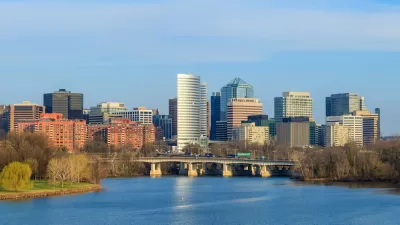Tysons, long famous for its office-park dominated version of suburbia, just approved a massive project that furthers an ongoing, dramatic urban transformation outside of Washington, D.C.
"The latest, and among the largest, efforts to rid Tysons of its suburban-style, surface parking-dominated office campuses is now full steam ahead," according to Michael Neibauer.
Specifically, adds Boro, "[t]he Fairfax County Board of Supervisors on Tuesday unanimously approved The Boro, a 4.2 million-square-foot development by the Greensboro Metro station that will feature the region’s largest Whole Foods, a six-story Showplace Icon multiplex, multiple multifamily and office buildings, and a couple of parks."
The development's mix of uses, after building in two phases, breaks down to 1,500 residential units, 1.8 million square feet of office, 316,000 square feet of retail, and 250,000 square feet of hotel space.
For the record, Wikipedia is reporting that in Summer 2016 Tysons will become the official name of the unincorporated area in Fairfax County, Virginia that is also referred to as Tysons Corner.
FULL STORY: Massive Tysons project, future home of flagship Whole Foods, approved

Maui's Vacation Rental Debate Turns Ugly
Verbal attacks, misinformation campaigns and fistfights plague a high-stakes debate to convert thousands of vacation rentals into long-term housing.

Planetizen Federal Action Tracker
A weekly monitor of how Trump’s orders and actions are impacting planners and planning in America.

In Urban Planning, AI Prompting Could be the New Design Thinking
Creativity has long been key to great urban design. What if we see AI as our new creative partner?

King County Supportive Housing Program Offers Hope for Unhoused Residents
The county is taking a ‘Housing First’ approach that prioritizes getting people into housing, then offering wraparound supportive services.

Researchers Use AI to Get Clearer Picture of US Housing
Analysts are using artificial intelligence to supercharge their research by allowing them to comb through data faster. Though these AI tools can be error prone, they save time and housing researchers are optimistic about the future.

Making Shared Micromobility More Inclusive
Cities and shared mobility system operators can do more to include people with disabilities in planning and operations, per a new report.
Urban Design for Planners 1: Software Tools
This six-course series explores essential urban design concepts using open source software and equips planners with the tools they need to participate fully in the urban design process.
Planning for Universal Design
Learn the tools for implementing Universal Design in planning regulations.
planning NEXT
Appalachian Highlands Housing Partners
Mpact (founded as Rail~Volution)
City of Camden Redevelopment Agency
City of Astoria
City of Portland
City of Laramie




























